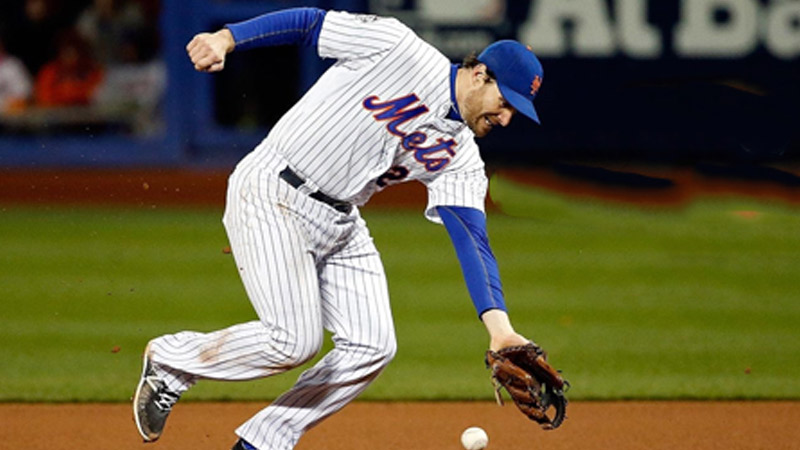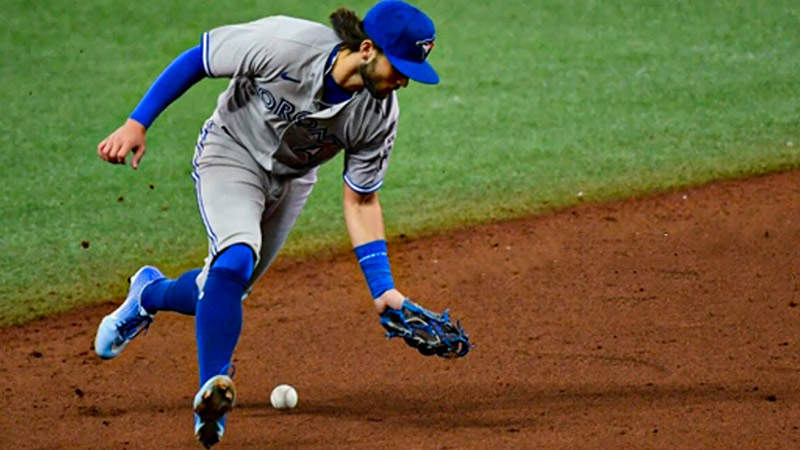Errors in baseball are an integral part of the game, highlighting defensive lapses that can directly affect the outcome. Understanding the definition, types, and impact of errors is essential for evaluating defensive performance.
However, there are common misconceptions that need to be addressed to gain a comprehensive understanding of errors in baseball. And it is not a rare case that spectators don’t understand those facts properly.
Well, if you are looking for a well-prepared guide to understand the errors, you are in the right place. In this blog, you will get a complete guide on this concept, discussed in the best possible way.
Definition of Errors
Errors play a crucial role in baseball, as they are defensive mistakes that can directly impact the outcome of a game. In this section, we will explore the definition of errors and delve into the official scorer’s role in determining them.
Additionally, we will discuss the criteria used to assign an error and provide examples of defensive plays that can result in errors.
Official Scorer’s Role in Determining Errors
In every baseball game, there is an official scorer whose responsibility is to keep track of all the game’s events and assign official statistics to each player.
One of the scorer’s tasks is to determine whether a defensive play should have resulted in an out or allowed a baserunner to advance. This judgment is crucial in determining whether an error should be charged to a fielder.
Criteria for Assigning an Error
Assigning an error requires careful consideration of certain criteria. The official scorer assesses whether the fielder’s misplay was a routine play that should have been made with ordinary effort.
If the play falls short of what is expected, an error may be assigned. Additionally, the scorer evaluates the impact of the misplay on the offensive team, such as allowing a baserunner to reach or advance beyond what is normally expected.
Defensive Plays That Can Result in Errors
Errors can occur in various defensive situations during a baseball game. Some examples include a fielder dropping a fly ball that should have been caught, mishandling a routine ground ball resulting in a missed out, or making an errant throw that allows a baserunner to advance.
Additionally, errors can happen during attempted pick-off plays or miscommunication between fielders, leading to missed opportunities for outs.
Overall, errors in baseball highlight the importance of defensive execution and the impact it can have on the game. Understanding the official scorer’s role in determining errors, the criteria used to assign them, and the types of defensive plays that can result in errors provides valuable insight into the intricacies of the sport.
Types of Errors
Errors in baseball can be of different types. Here are the types listed with short descriptions.
Fielding Errors
Fielding errors are perhaps the most common type of error in baseball. They occur when a fielder fails to properly handle the ball, resulting in a missed opportunity for an out.
Some examples of fielding errors include dropping a fly ball that should have been caught, mishandling a routine ground ball, or making an errant throw to a base.
These errors often occur due to lapses in concentration, poor technique, or misjudgment of the ball’s trajectory.
- Dropping a fly ball: Fielders, particularly outfielders, may misjudge the flight of a ball or fail to secure it properly, leading to a dropped catch. This can occur during routine pop-ups or deep fly balls, and it grants the batter an opportunity to reach base safely.
- Mishandling a ground ball: Fielders, both infielders and outfielders, may fail to field a ground ball cleanly or bobble it, resulting in a missed out. This can happen during routine grounders or sharply hit balls that require quick reactions and precise fielding skills.
- Making an errant throw: Fielders, when attempting to make a throw to a base or home plate, may release the ball inaccurately, leading to an errant throw. This can occur due to rushing the throw, poor footwork, or simply making a mistake in judgment. An errant throw allows baserunners to advance or batters to reach base safely.
Communication Errors
Communication errors occur when there is a breakdown in coordination and understanding among fielders. These errors often result from miscommunication on fielding responsibilities or a lack of coordination during plays that require multiple fielders’ involvement.
- Lack of coordination between fielders: Fielders may fail to communicate effectively, leading to collisions or missed opportunities for outs. For example, two fielders might both attempt to catch the same fly ball, resulting in a dropped catch or collision that allows the batter to reach base.
- Miscommunication on fielding responsibilities: Fielders may have confusion about who should field a particular ball or cover a specific base, leading to missed opportunities for outs or defensive confusion. This can occur during plays involving bunts, infield pop-ups, or baserunner pick-off attempts.
Mental Errors

Mental errors are less tangible but equally significant types of errors in baseball. They involve mistakes in decision-making or failures to execute fundamental aspects of the game.
- Failing to cover a base: Fielders may forget to cover a base during a play, leaving it unoccupied and allowing baserunners to advance. This can happen when fielders lose track of the play’s development or fail to anticipate the need to cover a particular base.
- Poor decision-making leading to defensive mistakes: Fielders may make errors in judgment or attempt risky plays that result in defensive breakdowns. This can include trying to make a difficult play instead of opting for a safer play or attempting to throw out a runner when the better decision would be to hold the ball.
Understanding the different types of errors helps to highlight the complexities of fielding and the challenges that fielders face in executing plays accurately.
It emphasizes the importance of not only physical skills but also effective communication, coordination, and mental focus in avoiding errors on the field.
Impact of Errors
Even though these are some kind of error in the match, they have a great impact on the match. You will get them well from the below points.
Advancement of Baserunners
When a fielder commits an error, it often allows baserunners to advance further than they would have if the play had been executed correctly. For example, if an outfielder drops a fly ball, the batter may be able to reach base safely or even advance to second or third base.
This places additional pressure on the defense and provides the offensive team with a better opportunity to score runs.
Extended at-bats for Batters
Errors can also result in extended at-bats for batters. When a defensive play is not successfully executed due to an error, it allows the batter to continue their at-bat instead of being put out.
This provides the batter with additional chances to get on base, drive in runs, or contribute to offensive momentum. Extended at-bats can change the course of an inning or a game, potentially leading to more runs scored by the offensive team.
Possibility of Unearned Runs
Errors can lead to the scoring of unearned runs. An unearned run is a run that is allowed by the defense but is not considered the fault of the pitcher.
If an error occurs and subsequently allows a baserunner to score, any runs that are scored as a result of that error are considered unearned. Unearned runs can impact the final score of a game and can be attributed to the defensive lapses represented by errors.
Influence on Pitching Statistics
Errors can have an impact on a pitcher’s statistics, particularly their earned run average (ERA). When an error occurs, any runs that score as a result of that error are not counted as earned runs against the pitcher.
This means that a pitcher’s ERA may not accurately reflect their individual performance if errors have affected the outcome of a game. Errors can also influence other pitching statistics, such as walks, hits allowed, and the number of pitches thrown, as they extend innings and create additional opportunities for opposing hitters.
Errors in baseball have various consequences that affect the flow of the game, offensive opportunities, and pitching statistics. They can result in the advancement of baserunners, extended at-bats for batters, the possibility of unearned runs, and impact the evaluation of a pitcher’s performance.
Minimizing errors and maintaining strong defensive play is crucial for teams to succeed on the field and improve their overall performance.
Tracking and Recording Errors
Official scorekeepers are responsible for observing and documenting every event that occurs during a baseball game. They play a crucial role in assessing defensive plays and determining whether an error should be assigned to a fielder.
Scorekeepers are typically impartial individuals appointed by the league or team to ensure fair and accurate record-keeping. Their judgments and decisions regarding errors significantly impact the statistical records and analysis of the game.
Recording Errors in the Scorebook
Errors are meticulously recorded in the scorebook, a comprehensive record of the game’s events. When an error occurs, the scorekeeper notes the specific play, the fielder involved, and the type of error committed.
The scorebook serves as a historical archive of the game, providing detailed information about defensive mishaps that occurred during each inning. This record allows for accurate statistical analysis and evaluation of individual and team performances.
Use of Errors in Statistical Analysis and Evaluation
Errors play a significant role in statistical analysis and the evaluation of defensive performance. They are utilized in various metrics and assessments to gauge a player’s fielding proficiency.
Errors are included in fielding percentage, a statistic that measures the number of plays a fielder successfully completes without committing an error.
Additionally, errors impact defensive runs saved (DRS) and ultimate zone rating (UZR), which are advanced metrics used to evaluate a fielder’s overall defensive value.
Errors are also considered in evaluating a team’s defensive efficiency and effectiveness. Teams with a high number of errors may be deemed less reliable in the field, while teams with fewer errors are often regarded as having better defensive prowess.
It can influence managerial decisions, such as adjusting defensive strategies or making player substitutions to optimize performance.
Furthermore, errors contribute to the assessment of a player’s growth and development. Identifying recurring patterns of errors can indicate areas for improvement and targeted training. Coaches and scouts closely analyze error statistics to assess a player’s defensive skills and potential for growth.
Official scorekeepers play a vital role in tracking and recording errors during baseball games. Errors are meticulously recorded in the scorebook and serve as valuable data for statistical analysis and evaluation.
They are used in various metrics to assess fielding proficiency, evaluate team defense, and identify areas for improvement. The comprehensive tracking and utilization of errors contribute to the ongoing development and understanding of the game of baseball.
Common Misconceptions About Errors
There are a few sorts of misconceptions in this regard. The facts are discussed right below.
Errors as Solely the Fault of the Fielder

One common misconception is that errors are solely the fault of the fielder committing the mistake. While fielders are responsible for executing plays correctly, errors can result from a variety of factors beyond their control.
External factors such as weather conditions, difficult fielding surfaces, or challenging play can contribute to errors. Additionally, the speed, trajectory, and spin of a batted ball can create challenging situations for fielders.
It is important to consider these external factors when evaluating errors and not place sole blame on the fielder.
Errors and Earned Run Average (Era)
Another misconception revolves around the relationship between errors and earned run average (ERA), a key pitching statistic. It is important to note that errors do not directly impact a pitcher’s ERA.
If a defensive error occurs and runs are scored as a result, those runs are considered unearned and are not factored into the pitcher’s ERA. The distinction between earned and unearned runs allows for a more accurate evaluation of a pitcher’s individual performance.
Therefore, errors should not be solely used to judge a pitcher’s effectiveness or ERA.
Errors as a Reflection of Overall Defensive Ability
A common misconception is that errors alone reflect a player’s overall defensive ability. While errors are indicative of a defensive lapse, they do not provide a complete picture of a player’s defensive skills.
Players may have exceptional range, make spectacular plays, and demonstrate strong throwing arms, but can still commit errors on occasion. Errors should be viewed as isolated incidents rather than a comprehensive measure of a player’s defensive ability.
Evaluating defensive skills requires considering various factors, including range, arm strength, fielding technique, positioning, and the ability to make difficult plays.
Errors in baseball are often misunderstood, and addressing common misconceptions is essential in gaining a more accurate understanding of their impact on the game.
It should not be solely attributed to the fielder, as external factors can contribute to their occurrence. They do not directly affect a pitcher’s ERA, as unearned runs resulting from errors are not factored into the calculation.
FAQs
Can errors be subjective?
Yes, errors can be subjective to some extent. The official scorer, who determines errors, uses their judgment based on established criteria. However, different scorers may have slightly different interpretations, leading to some subjectivity in the assignment of errors.
Are errors always recorded as individual statistics for fielders?
Yes, errors are recorded as individual statistics for fielders. Each fielder who commits an error is charged with one error in the official scorebook.
This allows for tracking and evaluating the defensive performance of individual players.
Can a pitcher commit an error?
Yes, pitchers can commit errors. Although pitchers are primarily responsible for pitching rather than fielding, they can still commit errors if they fail to make routine plays, mishandle batted balls, or make errant throws.
However, pitchers are generally less likely to commit errors compared to other fielders.
Are errors only recorded for fielding plays?
Errors are primarily recorded for fielding plays, as they involve defensive mistakes made by fielders. However, errors can also occur in other situations, such as failed pick-off attempts or mishandling of bunts by the pitcher or catcher.
Can there be multiple errors on a single play?
Yes, it is possible for multiple errors to occur in a single play. For example, if a fielder drops a catchable fly ball and then makes an errant throw attempting to recover, two errors may be recorded.
Each error is attributed to the specific mistake made by the fielder on that particular play.
Wrapping Up
Errors in baseball are defensive mistakes that can have a significant impact on the game. They are not solely the fault of the fielder, can influence pitching statistics, and are not always indicative of a player’s overall defensive ability.
Understanding and dispelling common misconceptions about errors enhances our appreciation of the complexity of the game. You might have more confusion left in this context. If yes, please let us.
Here we are leaving for today. We’ll soon come back with something new. Thank you.







